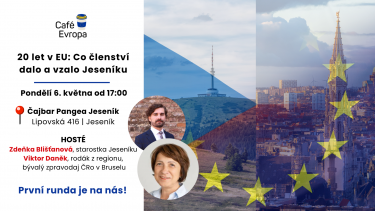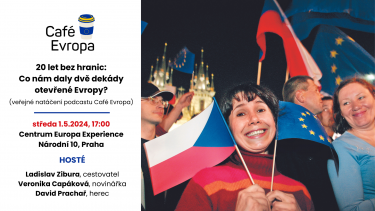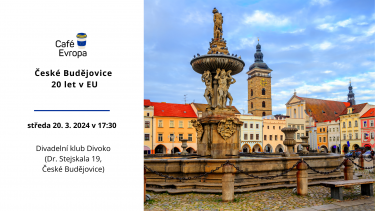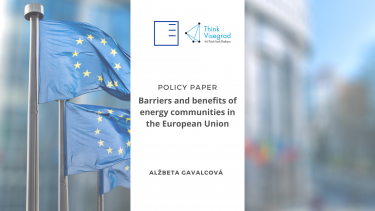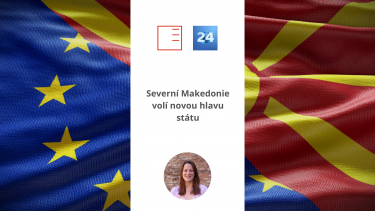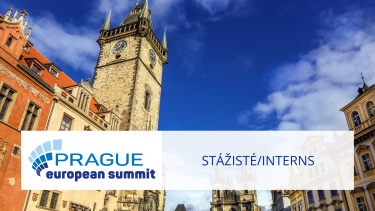Café Evropa | 20 years in the EU: what has membership given and taken away from Jeseník?
We invite you to the next Café Evropa debate! Green Deal, migration, security, EU elections, EU subsidies... Are you interested in what's in it for Jeseník? Our guests will answer these and other questions. Come and discuss!
Show moreCafé Evropa | 20 years without borders: what have two decades of open Europe given us?
We invite you to a public recording of the Café Evropa podcast. Come and discuss twenty years of open Europe with representatives of the generation that has lived most of its life there, as well as those who remember the past regime and the waiting at the borders. What do you remember?
Show moreCafé Evropa: České Budějovice 20 years in EU
We invite you to the next debate of the Café Evropa series. Come and talk to us about what current european issues are resonating in České Budějovice and how you imagine Europe. Are you interested in nuclear energy, electromobility, euro, local projects supported by the EU, culture or any other european topics?
Show morePolicy Paper | Barriers and benefits of energy communities in the European Union
Energy communities are an effective means to decentralize and renew our energy systems with sustainable solutions as they are usually based on renewable energy. They have already started emerging in 1970´s, yet there has been a significant increase in their development only in recent years, also in terms of their introduction into the EU legislation. Especially in Western and Northern European countries the concept already enjoys vast popularity. On the other hand, in Central and Eastern European countries (further referred to as CEE) energy communities are only beginning to emerge. The policy brief (based on literature and interviews with various stakeholders ) examines the benefits energy communities may bring, and more importantly, the main obstacles remaining in their way for greater evolution in the CEE region – and especially Visegrad countries (V4). As these initiatives progress, sharing the best practices will ensure the success of the community energy in the energy transition. Writes Alžbeta Gavalcová.
Show moreČT24 | Northern Macedonia elects new head of state
Polls opened in North Macedonia on Wednesday for the first round of the presidential elections. Seven candidates are running for the presidency in a country gripped by political tensions, disappointment with democratic reforms and aspirations to join the European Union. Jana Juzová, a senior researcher at EUROPEUM Institute, analysed the situation in an interview for ČT24.
Show moreCALL FOR APPLICATIONS- internships at Prague European Summit 2024
Are you interested in the European Union and the future of the European continent? Do you want to work in an international team and gain experience in organising events at the highest political level? Apply by 10 May and get a unique experience organising the Prague European Summit conference.
Show morePolicy Paper | FROM STICK SHIFT TO SKILL SHIFT? Reskilling of automotive's employees in the eyes of the industry's stakeholders
There is no time to wait in retraining the employees of car manufacturers if we do not want our car industry to fossilize and disappear. Writes Rebeka Hengalová, research fellow at EUROPEUM Institute.
Show moreThink Visegrad Fellowship offer: Call for proposals 2024
The Think Visegrad platform, which brings together think tanks from the Visegrad countries, including the EUROPEUM Institute for European Policy, is offering eight visiting fellowships to non-Visegrad expert fellows for the period Summer/Autumn/Winter of 2024. The duration of fellowships varies from 6 to 8 weeks (based on agreement with the hosting institute).
Show more20 Years of Reuniting Europe’s East and West: Is the EU Ready for Another “Big Bang” Enlargement?
We would like to invite you to a debate on a topic "20 Years of Reuniting Europe’s East and West: Is the EU Ready for Another “Big Bang” Enlargement?" The debate will take place on Thursday, April 4, from 16:00 to 17:15 h at Prague University of Economics and Business.
Show moreRILSA | The uncertain fate of the Green Deal for Europe ahead of the European Parliament elections
Farmers' protests have reminded that the measures of the Green Deal for Europe may not be politically viable for Europeans. To make climate policies politically viable, the EU should therefore focus on its commitment not to leave anyone behind in the green transition. Klára Votavová, a researcher at EUROPEUM Institute for European Policy, discusses the current development of the Green Deal for Europe and its social policy aspects in an expert publication for the Social Policy Forum.
Show moreStaroměstské náměstí 4/1
Prague 1 - Staré Město
110 00
tel.: +420 212 246 552
email: europeum@europeum.org
https://www.europeum.org
